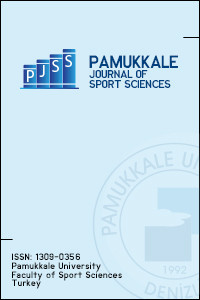The Effect of Individualized Exercise Training Applied to Autistic Individuals on Motor Development
The Effect of Individualized Exercise Training Applied to Autistic Individuals on Motor Development
The aim of this research is to examine the effect of motorized development of individualized exercise training that is regularly applied to autistic individuals. The study included 10 boys with an average age of 11.7 (±1,9) who were educated at the Agir Vivre L'autisme school in Paris and 18 boys and 2 women with an average age of 13 (±2,9) who were educated at the Izmit Autism Sports Club Association in Kocaeli. It covers a total of 30 children. The practice lasted eight week, five days a week and two hours a day. Wilcoxon test, which is a nonparametric test, was applied to the obtained data after descriptive statistical procedures (mean, standard deviation) in the SPSS 21.0 package program. The meaning level was taken as 0.01. A statistically significant difference was found between the pretest-posttest results of all the parameters of the study group (p <0.01). As a result of this research, it can be stated that the physical activity program which is applied regularly, systematically and correctly to the children with autism makes an important contribution to the development of the children's motor.
Keywords:
Autism, physical activity,
___
- Alp, H., Çamlıyer, H. (2016). Relation between movement education, physical activities and correcting behavioral problems of autistic children journal of research in education and teaching, 5(2), 26 ıssn: 2146-9199.American Psychiatry Association. (2014). Çev: Ertuğrul Köroğlu. Dsm-5 diagnosis criterions book Diagnostic and Statistical Manual of Mental Disorders. Ankara: HYB yayıncılık.Baniel, A. ( 2015). Çev: Yonca Dalar. Children crossing the limits. s. 127-128. İstanbul: Doğan Kitap.Benson, S. (2016). Date of Access: 19 Mart 2018, https://www.psychiatry.org/patients-families/autism/what-is-autism-spectrum-disorderDarıca, N. Abidoğlu, Ü. Gümüşçü, Ş. (2005). Autism and autistic children. Ankara: Özgür.Güler, M., Bayazıt, B., Yılmaz, O., Ongül, E. (2017). Effect of entertaining athletics studies on psychomotor development. Sports and Educational Sciences Journal, 4 (1), ss 1-8.Hands, B.P., Larkin, D., Parker, H., Straker, L., Perry, M. (2009). The relationship between physical activity, motor competence and health-related fitness in 14-year-old adolescents. Scand J Med Sci Sports. 19(5) s. 655–663.Keskin, B., Hanbay, E., Kalyoncu M. (2017). Effect of exercises on sportive performance at autistic children with age range; 5-8, İstanbul University journal 7(2) 133-1414.Korkmaz, B. (2017). That is Autism. İstanbul : Aba ISBN: 978-605-66593-7-9 Lovaas, O. I. (2005). Çev: Oya Sorias Book of Me. İstanbul : Sistem.Loann, B., Melanie, D.S.M., Françoise, C. (2017). L’activite physique adaptee chez l’enfant avec des trobles du spectre l’autisme : une dimension de bien-etre? Undergraduate thesis Geneva.Massion, J. (2006). Sports et autisme sport practice in autism science &sports 21(4) s:243-248 Doi: https://doi.org/10.1016/j.scispo2006.07.001Mukaddes, N.M., Tanıdır, C. (2015). Psychiatric comorbidity in Autism Spectrum Disorders. Turkish clinics journal child psychiatry-special topics 1(2):30-42 ISSN : 2149-7915.Pelligrino, L.T. (2009). Handbook of Motor Skills: Chapter 20: Development, Impairment and Therapy. Keane A.M. Nova Science Publishers; Hardcover. ISBN: 978-1-60741-811-5.Rujuta, W.B. Peter, E.G. Rinehart, N.J (2018). Motor development and delay: advances in assessment of motor skills in autism spectrum disorders Current Opinion in neurology, London. 31(2) ss:134-139 Doi:10.1097/WCO.0000000000000541. Tufan, İ. (2006). Autistic kid. İstanbul : İletişim.Torres, E.B., Whyatt, C. (2018). Autism the movement-sensing perspective. New york crc press ISBN: 13:978-1-4822-51630.Wing, L. (2010). Çev: Semra Kunt. Autism manual. İstanbul : system. Yanardağ, M. (2007). Effect of different exercises on motor performance and stereotype behaviors on autistic children. Ankara : Hacettepe University doctoral thesis.Yanardağ, M., Ergun, N., Yılmaz, İ. (2009) Effect of adapted exercise education on physical adaptation level on autistic children. Physiotherapy Rehab. 20(1):25-31.Yanardağ, M., Yılmaz, İ. (2017). Physical education and sports for student with special needs. Ankara: Pagem akademi Doi: 10.14527/9786053187745 s. 252-280.Yılmaz, A., Şentürk, U., Demir, E. (2015). Content analysis of applications for mentally disabled people’s physical activity , Academic Social Researches Journal. 3(13) s.312-327.Autisme Speak. (2018). https://www.autismspeaks.org/science/science-news/cdc-increases-estimate-autism%E2%80%99s-prevalence-15-percent-1-59-children Erişim tarihi 26.04.2018.
- Başlangıç: 2010
- Yayıncı: Pamukkale Üniversitesi
